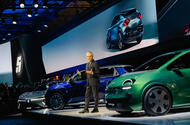CEO Luca de Meo says Renaulution plan has been a success and "now it's time for us to open a new chapter"
The Renault Group has launched a new company strategy that will have it develop new revenue streams outside of vehicle production and bid for "Champions League" status in innovation.
The new initiative – dubbed Futurama – builds on the success of CEO Luca de Meo's Renaulution transformation plan, which was launched in 2021 and has underpinned a significant turnaround for the company, taking it from returning heavy losses to a position of market-leading financial health.
In 2024, the Renault Group posted record profits – for the third year running – of €4.3 billion, up €146 million on 2023. That represents a margin of 7.6%, up from an 0.8% loss in 2020 and almost equal to that achieved by Mercedes-Benz last year.Â
The company was joined only by Ferrari, de Meo noted, in achieving its original guidance for 2024 - testament to the efficacy of the Renaulution plan, the goals of which have now been achieved.
"We have done the job in the past four or five years to put Renault back at its best level ever, and we are now ready to go much further and faster," he said.
"We have turned Renault Group into a nimble, effective and efficient machine, fit for navigating today's stormy waters.
"But that was just the appetiser: now it's time for us to open a new chapter, allowing this company to surf the wave of opportunities created by the unprecedented disruption on the way."
The Futurama plan is built on three core pillars, explained de Meo.Â
"First, it will be about investing in the group - reinvesting in ourselves," he said, referring to a plan to put the Renault Group "in the Champions League of car makers" when it comes to technological innovation and productivity.
The second pillar is about boosting scale, which is "key in an industry which is capital-intensive". De Meo cited the company's partnerships with Google on software and Geely on combustion engines as examples of how to achieve this and said it will now review the 20 strategic partnerships it has organised since 2021 and "accelerate and reinforce this approach".
The third pillar is freeing Renault from "the cyclicity [sic] curse which always looms over this industry", meaning the company will diversify its operations beyond the core business of building vehicles.
Renault will target new revenue streams "adjacent to our traditional business", de Meo said, pointing to opportunities in the software, finance and energy sectors - but stopping short of confirming any precise plans.
"It's not about breaking away from what we've always done; it's about broadening our scope and going where there is value to create," he said.
"These are times for the brave and for the challengers, those that would dare to take risks and make decisions faster. Renault Group over the last four years has been an exemplar of that - and what I can assure you is that we are going to stick to that disruptive mindset."
Further details on the specifics of the Futurama strategy are expected to follow later in the year, but de Meo did reveal that the launch of seven new models will help to drive further growth in 2025, including the Renault 4, Dacia Bigster, Alpine A390 and Mobilize Duo and Bento. Two important facelifts are also scheduled this year, understood to be for the Renault Austral SUV and Mégane EV.Â
De Meo also promised the launch of a new Renault model designed to "democratise EVs on the international market", but it's unclear if he was referring to the new Twingo, which is due later this year.

